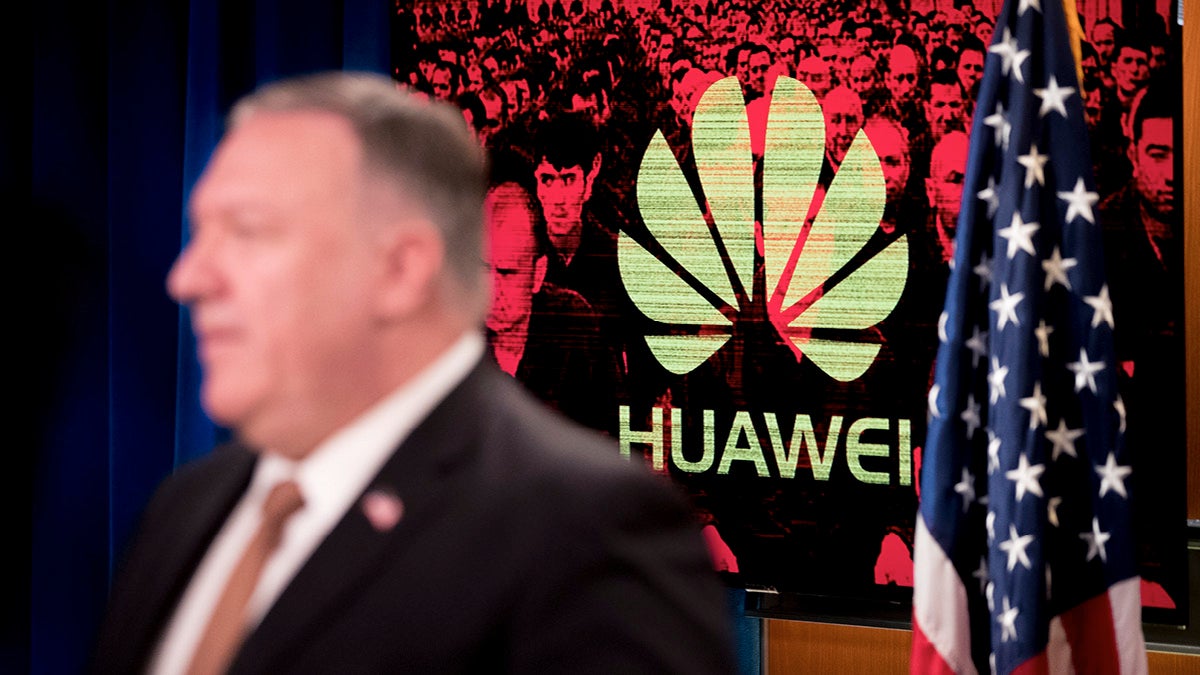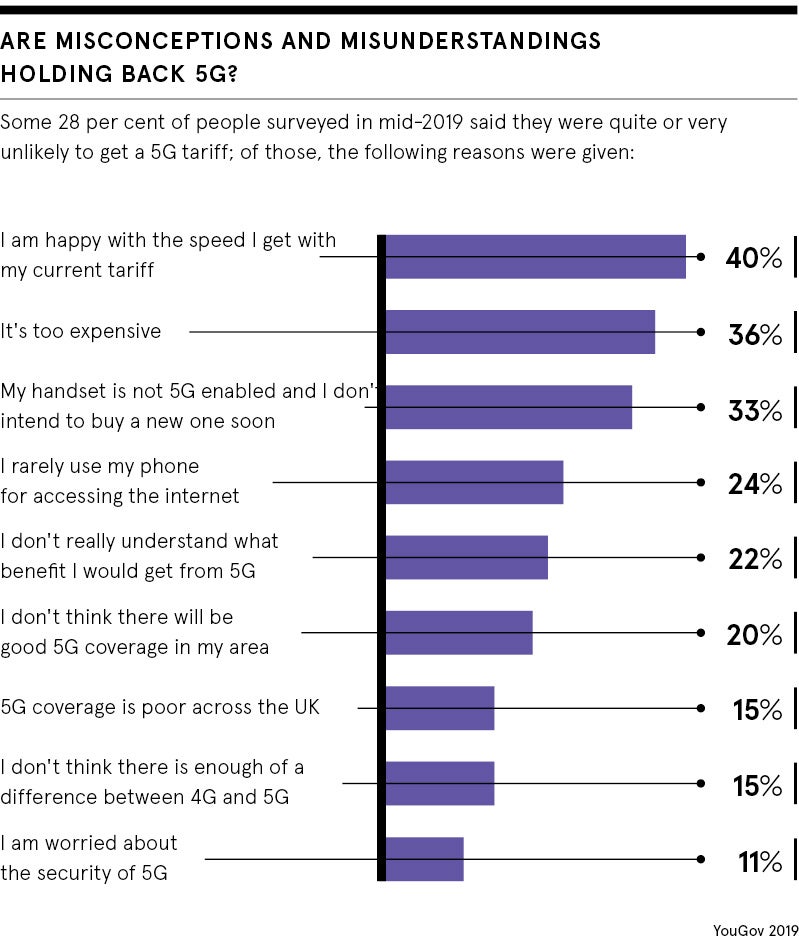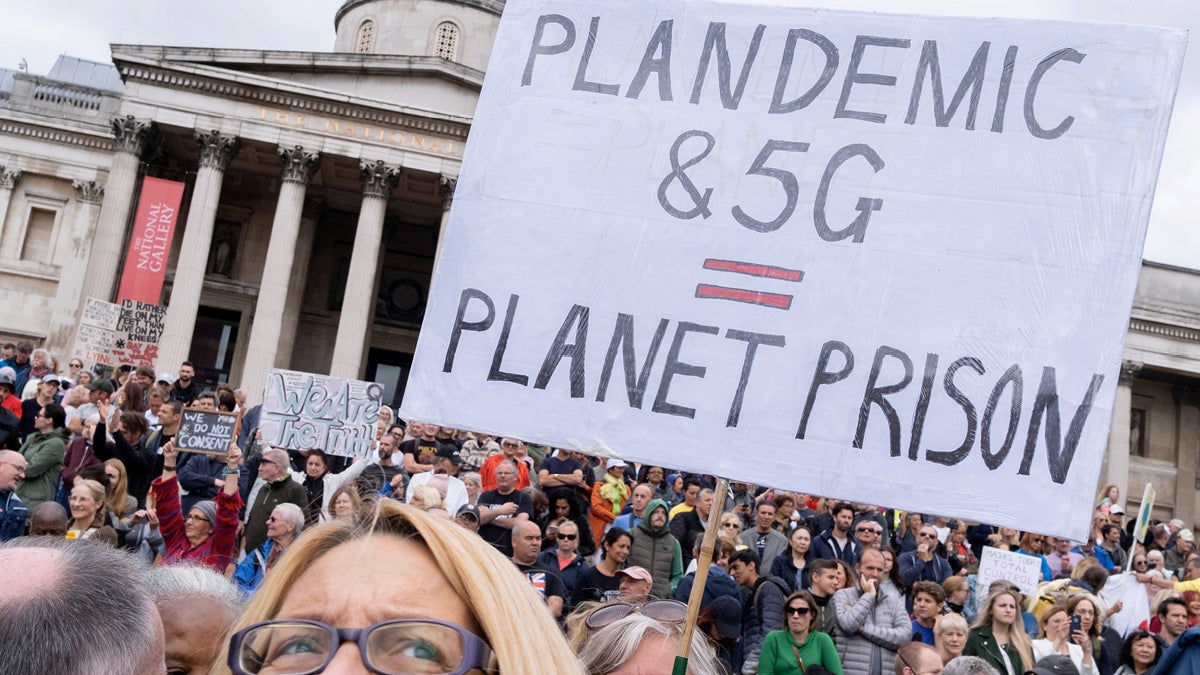
The UK’s 5G network is not yet in place, but that hasn’t stopped the technology dominating the political news headlines twice this year, albeit for very different reasons.
The first media scream came in April, when online conspiracy theories linking the 5G network to coronavirus spilled over into the real world. Base stations were vandalised and set alight, telecommunications engineers suffered physical and verbal abuse, and cabinet secretary Michael Gove was forced to warn against the spread of this “dangerous nonsense”.
Then in July, Boris Johnson’s government announced an unexpected ban on buying new Huawei 5G equipment from the end of the year and stated that any existing kit from the Chinese telecom giant would need to be removed from UK telecommunications networks by 2027.
Following in the footsteps of President Donald Trump’s United States, the government implied there was a threat to national security from continuing to work with Huawei, though notably not an immediate security threat, given the timeline.
Why 5G networks got politicised
Governments have always participated in tech standard initiatives around communication infrastructure. “The fact they’re involved in 5G is nothing new,” says Dr Robin Mansell, professor of new media and the internet at the London School of Economics and Political Science. “But that doesn’t explain the politicisation of it.”
She believes the decision to ban Huawei equipment was less about a threat to national security and more to do with the wider geopolitical and trade issues between America and China, tied into the enormous economic potential of 5G. “Whether you can snoop using these technologies is the least of the transformation that is taking place,” says Mansell.
As The New York Times commented in April, 5G has an “an outsize political importance” because the technology could be revolutionary, providing a competitive edge for countries within the global economy, as ultrafast wireless network speed and latency (data transference) enables all manner of virtualised innovation.
According to Dr Mischa Dohler, professor of wireless communications at King’s College London, who specialises in 5G networks, governments are especially interested in this new enhanced level of connectivity and its ability to provide services on demand, as research suggests it could bring happiness as well as productivity to a population.
The diplomatic fireworks… highlight great power rivalries that are currently being fought in cyberspace
He says: “Looking back over the past 20 to 40 years, we’re able to build fairly reliable statistics on the direct correlation between the degree of connectivity and happiness as well as GDP.”
Thanks to Huawei equipment, China is already well ahead with its own 5G rollout. By the end of the year, 300 of its largest cities will have 5G coverage, and that’s when the innovation and resulting economic growth could really kick in.
So, it’s perhaps no surprise that an increasingly protectionist American administration wanted to clip China’s wings and get in on the act themselves. “The diplomatic fireworks… highlight great power rivalries that are currently being fought in cyberspace,” says a recent report titled Network and Geopolitics, from cyber-intelligence experts Oxford Information Labs.
How the Huawei fallout impacted 5G rollout
For the United States, and the countries that followed in its wake including the UK and Australia, the big risk with removing Huawei equipment from their networks, aside from being costly and time consuming, is it stunts their own 5G rollouts.
For Mansell at the LSE, it’s less about how fast a country’s 5G rollout happens but “who moves slightly more quickly than others”. She says: “The US government view has been ‘let’s Balkanise everything and develop our own 5G standards… we’ll catch up’. But I would be extremely dubious about that.”
Especially given that China will be encountering no such delays. “China is poised to assume first-mover advantage in 5G technology,” says the Oxford Information Labs report. This could help China quickly establish its own independence in terms of knowledge, and the hardware and software they need to build out in other parts of the world, be that in Asia, Africa or South America.

This could be very successful for them, but also lead to a divided, less-collaborative cyberspace, a “splinternet”. The report goes on to warn it could lead to “walled gardens of devices and services, capture of markets, further reduction in market competition and the emergence of a vertical, Chinese 5G tech monopoly”. Which, of course, poses a stark economic disadvantage to countries left behind, such as the UK, but also a new kind of security risk as countries pursue their own digital sovereignty.
Germany has a more-measured approach to Huawei, in part because Deutsche Telekom uses a lot of their technology already, but a decision on their future relationship with the Chinese telecom is expected this autumn. “The pressure on them is enormous,” says Mansell.
How governments can help 5G networks in the future
Instead of worrying about Huawei, Dohler from King’s College London advocates shifting the focus towards other ways the UK government can help facilitate 5G networks, such as by subsidising dark fibre rollout, a vital component in 5G connectivity. He says: “In the UK, one metre of road costs £100,000, but a metre of dark fibre costs 50p. You could lay dark fibre along any road, adding 0.001 per cent of budget and actually help rolling out a very strong fibre structure, which is very expensive for the operator.”
Dohler imagines China has such a framework already in place, while in India the government is rolling out 100,000km of dark fibre every day. “They don’t dig tunnels, they do it over roads, or through trees. But it serves a purpose; they are connecting their villages,” he says.
Also, the UK government could help with reducing the administration for operators around securing base stations. “Why not have a national auction framework? That would put the UK ahead of the game globally very quickly,” says Dohler.
Helping operators deal with the real-world consequences of online conspiracy theories relating to 5G is another task for governments all over the world, especially in the UK, America and Australia, though notably not in China. Dohler adds: “China has a governmental narrative that they really support 5G… none of my Chinese students talk about 5G being the end of the world.”

How can you tackle conspiracy theories?
Nonetheless, it’s a serious problem in the Western world, with the FBI even labelling fringe conspiracy theories as “domestic terrorism” last year. Dr Daniel Jolley, senior lecturer in psychology at Northumbria University, whose research during lockdown proved a link between violent behaviour towards the telecommunications sector, paranoia and a belief in 5G COVID-19 conspiracies.
Why does he think these ideas gain such traction? “They offer simple solutions for complex problems. Ideas that 5G causes harm have been around for a few years, so during lockdown in the whirlwind of ‘Is this really happening?’ people quickly linked that to COVID-19,” he says.
China has a governmental narrative that they really support 5G… none of my Chinese students talk about 5G being the end of the world
The government has tried to counter the conspiracies with facts and urged local councils to send out information pamphlets to “quell quack theories about 5G” by citing UK communications regulator Ofcom’s research, which debunks claims that 5G carries health risks.
But Jolley points out that while educating the public is important in reducing belief in conspiracies, the more hardline believers don’t trust the government anyway, so are unlikely to take their advice. Perhaps the answer, when it comes to quashing 5G conspiracy theories and dealing with the wider global rollout of 5G, is to try and focus on more collaborative and less politically charged approaches that draw on the expertise across academia, telecommunications networks, media, tech, intelligence agencies and independent regulators. All this at the behest of governments, but not in their name.

The UK’s 5G network is not yet in place, but that hasn’t stopped the technology dominating the political news headlines twice this year, albeit for very different reasons.
The first media scream came in April, when online conspiracy theories linking the 5G network to coronavirus spilled over into the real world. Base stations were vandalised and set alight, telecommunications engineers suffered physical and verbal abuse, and cabinet secretary Michael Gove was forced to warn against the spread of this “dangerous nonsense”.





